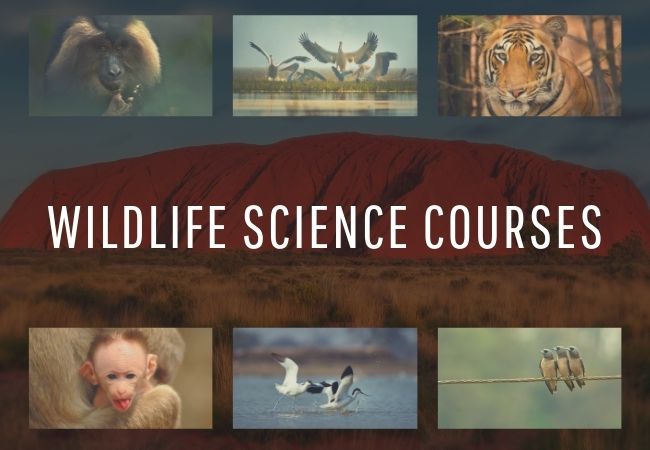
What is Wildlife Science?
Highlighting the importance and usage of ecology and biology, Wildlife Science is all about preservation of endangered species of animals and plants, management of ecosystems, and environmental regulations and policies.
Wildlife Science is known as an important discipline that utilises ecological knowledge that provides a balance between the needs of wildlife populations and the needs of society. If you are into animals and the environment, Wildlife Science can give you the opportunity to walk on the path toward pursuing your lifelong goal of helping animals survive and thrive together with humans.
What are the Key Skills to study Wildlife Science Courses?
Other than being called animal lovers, Wildlife Science students usually are the hands-on learners who are compassionate, career-driven, and are up for competition. Not only that, these are the set of key skills they possess —
Maths & Science: Being one of the Science disciplines, Wildlife Science requires knowledge in cellular biology, anatomy, ecology, chemistry and physics. Plus, in conducting scientific tests and experiments, they will need to be good in maths and statistics in order to analyse complex data.
Teamwork & Communication: Other than that, most of the time they will conduct research with other teams in monitoring environmental effects on animal populations. They also will need to partner up with policymakers to put together wildlife management and conservation plans. This is to say, they must be able to listen to others, understand them and express their ideas clearly verbally and in writing.
Critical thinking & Problem Solving: Importantly, they must be able to think critically and draw conclusions from test results and scientific observations. This will help in finding the best solutions to disease, habitat loss and other wildlife threats.
What are the Career Opportunities if I study Wildlife Science Courses in Australia?
Studying Wildlife Science will give you employment opportunities in agriculture, business and government. These are the common careers —
Wildlife Biologist – Wildlife biologists gather, analyze, and interpret data on wildlife and habitats. This includes their behavior, disease, ecology, genetics, nutrition, and many more to conserve wildlife species and improve their habitat conditions.
Wildlife Law Enforcement Officer – Wildlife law enforcement officers are responsible for enforcing laws and regulations to maintain wildlife populations. This includes conducting surveys of wildlife populations, implementing wildlife population controls, responding to complaints of wildlife, and educating the public about wildlife issues.
Environmental Consultant – Environmental consultants help in creating a safer environment for wildlife as well as humans. Typically, they work with consulting firms as well as both private and government agencies and help companies utilize natural resources while reducing or eliminating environmental damage.
What are the General Entry Requirements to study Wildlife Science Courses in Australia?
Academic Requirements
SPM (Prerequisite) | Minimum a credit in Mathematics |
STPM/Matriculation/Foundation | Minimum CGPA of 2.78 |
A-Level | Minimum aggregate score of 6 |
UEC | Minimum score of 25 |
International Baccalaureate (IB) | Minimum 26 points |
*The requirements may vary among universities, for inquiries on other entry requirements, contact Excel Education.
English requirements
IELTS | Minimum 6.5 |
TOEFL | Minimum overall 79 (Internet Based Test) |
PTE | Minimum 58 |
*The requirements may vary among universities, for inquiries on other English Language requirements, contact Excel Education.
Which are the Top Universities to study Wildlife Science Courses in Australia?
1. The University of Sydney
“The Taronga Wildlife Conservation stream also includes prescribed units of study in mathematics and animal sciences. It will provide students with extensive training in wildlife conservation by incorporating the study of biodiversity and evolution, animal science, and animal behaviour and management.”
Program Name | Bachelor of Science (Taronga Wildlife Conservation) |
Program Duration | 4 years |
Intakes | March, August |
Indicative Annual Fee | AUD$50,000 |
2. The University of Queensland (UQ)
“At UQ, degrees are called ‘programs’ and subjects are called ‘courses’. Here’s a sample of the courses you could study in this program:
- Animal Behaviour, Handling and Wellbeing
- Biology of Australian Marsupials and Monotremes
- Elements of Ecology
- The Management and Husbandry of Zoo Animals”
Program Name | Bachelor of Wildlife Science |
Program Duration | 3 years |
Intakes | February |
Indicative Annual Fee | AUD$43,504 |
3. The University of Adelaide
“Our conservation graduates go on to all sorts of exciting and rewarding careers. You might reconstruct local habitats or lead breeding programs in sanctuaries. You could monitor the movements of animals with satellite tracking and other remote techniques. Perhaps you’ll work in academia, researching your passion and inspiring the next generation of conservationists.”
Program Name | Bachelor of Science (Wildlife Conservation Biology) |
Program Duration | 3 years |
Intakes | February, July |
Indicative Annual Fee | AUD$41,500 |
4. University of Western Australia (UWA)
“You can choose to exit after three years with an Advanced Bachelor’s Degree in Wildlife Conservation, or continue with the Master of Biological Science and be awarded a Bachelor of Science and a Master of Biological at the end of the four years.”
Program Name | Bachelor of Science (Wildlife Conservation) and Master of Biological Science |
Program Duration | 4 years |
Intakes | February |
Indicative Annual Fee | AUD$34,030 |
5. Deakin University
“Throughout your studies, you’ll acquire knowledge, skills and practical expertise in a range of areas, such as:
- biodiversity
- wildlife and landscape ecology
- landscape and vegetation management
- conservation (such as planning and managing park/reserve networks, saving threatened species, and reducing threats)
- wildlife biology and behaviour
- fire ecology
- wildlife monitoring and research.”
Program Name | Bachelor of Environmental Science (Wildlife and Conservation Biology) |
Program Duration | 3 years |
Intakes | March, July, November |
Indicative Annual Fee | AUD$37,000 |
6. La Trobe University
“Our Melbourne Campus includes the La Trobe Wildlife Sanctuary, which is made up of over 30 hectares of bushland. Here, you’ll undertake research projects such as studying the behaviour of bat species and mosquitofish, and exploring and preserving the natural habitats of species like the long-nosed potoroo, brolga, black wallaby and sugar glider.”
Program Name | Bachelor of Science (Wildlife and Conservation Biology) |
Program Duration | 3 years |
Intakes | March |
Indicative Annual Fee | AUD$36,600 |
7. Edith Cowan University
“The course covers ecology, genetics, wildlife management, animal and plant biology, evolution and the theory and practice of conservation biology.”
Program Name | Bachelor of Science (Conservation and Wildlife Biology) |
Program Duration | 3 years |
Intakes | February, November |
Indicative Annual Fee | AUD$35,000 |
8. Federation University
“Graduates have a wide range of career opportunities in animal management and welfare, animal biotechnology and pharmaceutical industries, research institutes and centres, diagnostic laboratories, animal quarantine and disease surveillance, wild animal research and management.”
Program Name | Bachelor of Veterinary and Wildlife Science |
Program Duration | 3 years |
Intakes | March, November, July |
Indicative Annual Fee | AUD$28,200 |
Read next: Becoming A Veterinarian in Australia
Or check this one out: 5 Reasons to study Environmental Science in Malaysia
Contact us to find out more!
Student enquiries:
Call/Whatsapp: +60182414802
Email: [email protected]
For more stories like this, join the Excel Education community on Facebook
Need help with your uni application? Connect with us here

Heather
I seek peace and knowledge in discovering myself.

